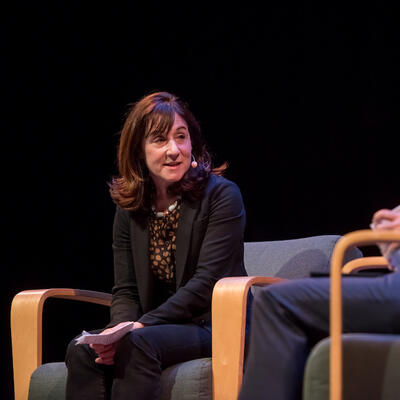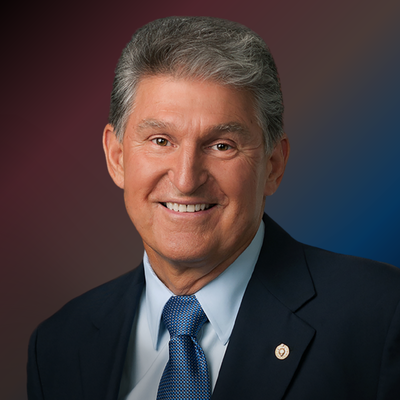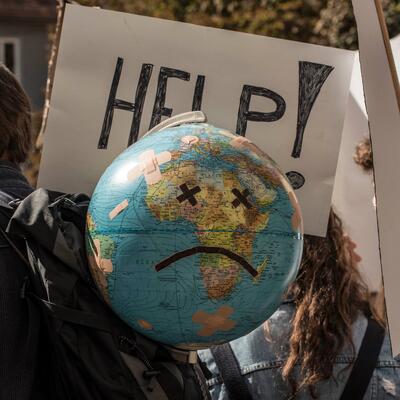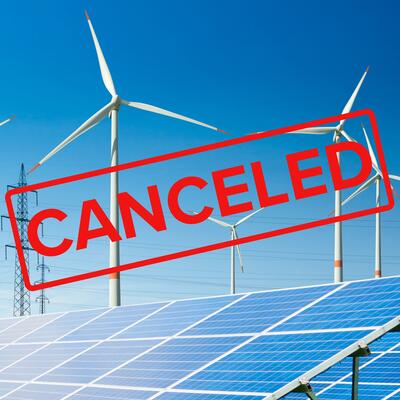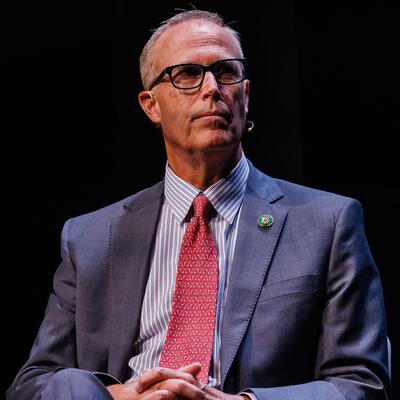
Scientists Who Won't Be Silenced
Guests
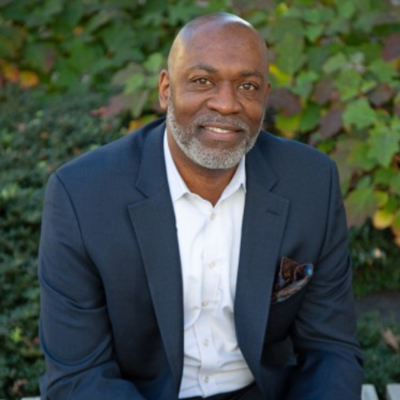
Brandon Jones
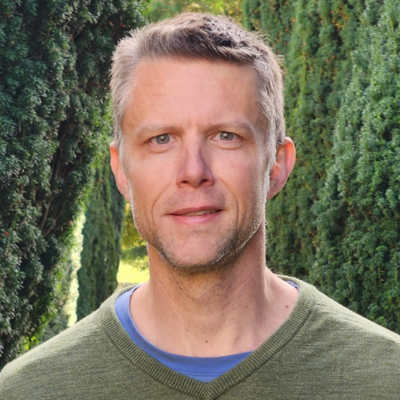
Wes Ingwersen

Rachel Cleetus
Summary
Within the federal government, science — especially climate science — has taken a beating. At the recent UN General Assembly, the President called the climate crisis, “the greatest con job ever perpetrated on the world,” and said climate science came from “stupid people.”
But climate scientists aren’t all taking it lying down.
“I see the natural and physical sciences as the caretakers of natural and physical truth,” says Brandon Jones, President of the American Geophysical Union. He worked as a scientist in the federal government for more than 20 years, 12 of those at the Environmental Protection Agency. He left his position just before the start of the second Trump administration.
Jones emphasizes that publicly funded science serves the public good. He believes that publicly funded science produces knowledge that “can be trusted and can be used in decision making…for the betterment of society overall. " He is concerned about political attacks on science, from funding cuts to mass layoffs of federal scientists and how federal layoffs were handled, “there didn't seem to be much thought behind it.”
Still, Jones remains committed to defending the truth. He says, “people are going to demand that they have access to information so that they can live better.”
The Environmental Protection Agency has been in turmoil for months. Former EPA environmental engineer Wes Ingwersen witnessed this firsthand from his position within the agency’s Office of Research and Development.
In his time at EPA, Ingwerson developed a database that pairs economic and environmental data to let an industry or government examine their supply chain. It's called the U.S. Environmentally Extended Input Output or USEEIO. Ingwerson says it was originally developed to help reduce waste and environmental impacts for lots of companies, but it’s become a fundamental tool for carbon emissions reporting.
“They were infiltrating federal agencies, including EPA,” says Ingwerson recalling the early days of the Trump administration, as the Department of Government Efficiency – or DOGE – was at full force. EPA has since announced they will no longer be updating USEEIO data.
Ingwerson ended up resigning from the EPA and has now moved to Stanford and launched the Cornerstone Sustainability Data Initiative, which is an open access platform for the same kind of research he was doing at EPA.
Rachel Cleetus, Senior Policy Director for Climate and Energy at the Union of Concerned Scientists, has said a controversial Department of Energy commissioned report produced by “handpicked climate contrarians,” is a prime example of disinformation becoming official policy.
Not only did the report violate transparency laws, but it also distorted research, leading Cleetus to call it “full of disinformation, cherry-picked data, in some cases just outright lies.”
She says undermining climate science puts public health, safety, and national security at risk. From hollowing out agencies like the National Oceanic and Atmospheric Administration and the EPA to disbanding independent advisory boards, the administration is eroding public trust in institutions meant to protect people. Still, many scientists are resilient: preserving data, speaking out, and continuing their work because, as Cleetus says, “facts still matter.”
Resources From This Episode (4)
Full Transcript
Note: Transcripts are generated using a combination of automated software and human transcribers and may contain errors. Please check the actual audio before quoting it.
Ariana Brocious: Well Kousha, this episode is a little bit of a tough one.
Kousha Navidar: Yeah. Not a lot of easy ways to say that stuff is getting erased that we depend on everyday, right?
Ariana Brocious: Yeah, we’re going to talk about this targeted campaign against science. And there’s a lot of good happening, there are a lot of scientists taking a stand and challenging this erasure of their life's work and we’ll talk about that too.
Kousha Navidar: So listener, if you're listening, we’re going to talk about stuff that’s not chipper, but there is a bright side and we will go there together. And we will look at the whole thing together. Let’s get into that. What do you think Ariana?
Ariana Brocious: Yeah so stick with us. I’m Ariana Brocious.
Kousha Navidar: I’m Kousha Navidar.
Ariana Brocious: And this is Climate One.
[music change]
Ariana Brocious: We are in some really uncharted territory in terms of support for facts and science. Facts and science are under real attack right now. Mostly coming directly from the Trump administration. And this is SO important because it affects each and every one of us.
Kousha Navidar: Right. As we’ll hear from our guests today, the independent, publicly available research and innovation done throughout the federal government provides the foundation for so many parts of our lives. And Trump is axing it.
Ariana Brocious: I mean, listeners are hearing our voices now because of technology based on government research.
Kousha Navidar: Touchscreens, GPS, computers, the cell phone, the internet! And that’s barely scratching the surface.
Ariana Brocious: Right, in addition there’s all kinds of federal advisory panels that keep us healthy and safe. And yet, since January, the Trump administration has been carrying out a full-fledged campaign against science, particularly climate science.
The administration has erased databases, tools, and websites, including the National Climate Assessment. And they’ve simply stopped collecting data of all kinds – including the Greenhouse Gas Reporting Program and the number of billion-dollar weather disasters, which, spoiler alert, keeps rising.
Kousha Navidar: They’ve also laid off thousands of career scientists across departments and ended funding for all kinds of research and agencies. And as we’ve talked about in recent episodes, they’ve rolled back established environmental protections.
Ariana Brocious: Yes. And in addition, right now Trump’s Environmental Protection Agency is working to undermine its own authority to regulate Earth-warming pollutants like carbon dioxide emissions. But scientists aren’t about to let their life’s work vanish. And that’s what we’re talking about today.
Kousha Navidar: Scientists are taking action – from former EPA researchers to independent academics. Many are maintaining open-access databases, and others are continuing fundamental research – like the work that goes into the National Climate Assessment – on new platforms. And they are doing it without the administration’s blessing.
Ariana Brocious: They’re also taking personal risk by speaking out against Trump administration and mobilizing to continue doing their important work.
[music change]
Kousha Navidar: Brandon Jones is someone continuing to make science happen. He worked as a scientist in the federal government for more than 20 years, 12 of those at the Environmental Protection Agency. He left his position just before the start of the second Trump administration to become President of the American Geophysical Union. And he’s been stunned by the way this new government has treated his field.
Brandon Jones: I see the natural and physical sciences as the caretakers of natural and physical truth, the truth about the earth, the truth about how the earth works and, and its position in our solar system. All of those kinds of things. And so when I think about it philosophically, the attacks on science, cutting funding impacting people's careers and things of that nature, I'm thinking about wow, is truth not values? Why do we not want to know about how the earth works and the interoperability of humans in the earth and how we can live more sustainably, et cetera. So, I go down this rabbit hole of well, what's, what's going on behind the scenes that we don't want truth to come out?
Kousha Navidar: Do you take it personally?
Brandon Jones: You know, that's like a rollercoaster ride. So some, some days I feel like the Cowardly Lion,
Kousha Navidar: Hmm.
Brandon Jones: Where I know I need to have courage, but I'm like, I don't know if I, and, and why am I feeling this way? And, and, you know, to taking it personal. And then the next day is I just want to come out swinging. Sometimes it is about the journey. So when you're asking me about my time at EPA and what I thought about it and, and even where I am now, it's like I reflect over all those years and I'm thinking it's about truth.
Kousha Navidar: Yeah. Let's dig into that a little bit. Why is the work of independent science and research done within the federal government specifically so important?
Brandon Jones: I would say number one, and, and I'm gonna compare what publicly funded science is to how it shows up in the private sector. No dis to the private sector, but there's lots of science that goes on in the private sector, but it's for stakeholders, it's for short timescales and is for a specific purpose and a specific reason. And publicly funded research in my mind is for the benefit of all. So whatever the products come or are developed out of publicly funded research, there was no special interest that was guiding that. It was through an independent, if it's federal funding, oftentimes competitive, process. And therefore, there are the best minds for that particular project. So then the products that come out of that can be trusted and can be used in decision making or, be plugged into the solution creation mechanisms for communities or, or for states or whatever. So there's high confidence in the decisions that are made, the solutions that are created, the applicability and the tools that are developed so that there's a betterment of society overall.
Kousha Navidar: Yeah. The stakeholders are the public.
Brandon Jones: That's correct. Yep. Yep. Yeah. Not shareholders, but stakeholders.
Kousha Navidar: Yeah. Right, The Trump administration has done massive layoffs of federal employees, particularly in the science related agencies. AGU, the American Geophysical Union that you're the president of, you've all been involved in some lawsuits regarding these personnel cuts. And a federal judge recently ruled that the Trump administration broke the law by indiscriminately firing federal workers in essential roles. What will that mean for federal scientists who are let go? Will they be rehired? Will it just be unfilled? What's your take?
Brandon Jones: First, just kind of at a high level, it's a huge morale booster for so many scientists and so many of the staff at the agencies that support scientists. So, as far as morale, given the last almost 10 months, it's gonna be great. It's gonna depend on how the agencies show up. If you go back and look in February this year, when those probationary employees are just let go across the government, some agencies handled it differently than others, and I think that's gonna be the case here. As you mentioned, it was indiscriminate, but there didn't seem to be much thought behind it either. It was just, ‘hey, we're just gonna do this.’ And then there was lots of backtracking. Oh, we didn't know that the federal government did this. We didn't know this was a federal service. And I hope that that kind of information has begun to filter out into the general public because I don't know how much of our citizenry really understands what the federal government does for them. So much of their taxes that go to federal support in particular in the sciences provides such great service to them, whether it be high risk, high reward innovations. They use Google, they use GPS, they have cell phones, and all the technology or if it's something a little longer term, like educational practices and, and what's the best way for students to learn? I mean, that takes years of scientific research.
Kousha Navidar: It's a really important point here with that sense of longevity and looking over the time horizon 'cause the Trump's agency and program cuts, and with all that research defunding, we've lost so many experienced professionals. And some of those talents are being recruited by other sectors. They're being recruited by other countries in some cases. So walk me through that aspect, like the potential brain drain. I guess, what will the short and long-term impact of this be on the science and research communities in the US specifically?
Brandon Jones: Yeah, that's a huge point. Let's start domestically There's a movement into other sectors within the country. Fine. I mean, the scientific enterprise was always larger than federal science or, private sector federal science or science that was conducted in academia. We've always needed scientific thinkers everywhere. I would dare say we need a lot more folks who think scientifically in our decision making halls and realms. You know, how many scientists are on the Capitol Hill? I don't know.
Kousha Navidar: Yeah, yeah.
Brandon Jones: Not a lot.
Kousha Navidar: More lawyers than scientists.
Brandon Jones: But yeah, that's true. You know, lawyers and, and, and business owners.
Brandon Jones: I'm talking to the choir now, so, but, but on this other side of the brain drain out of the nation into other countries, that's a serious issue. I have talked to some early career and mid-career scientists here in the states who have told me they're being offered options and positions in other countries at universities or research labs, facilities and things of that nature. So, you know, 75, 80 years ago. It was scientists from certain countries in Europe and maybe even in Asia that were coming over helping with the Manhattan Project and things of that nature. And it, it looks like it's, there's a slow trickle in the opposite direction.
Kousha Navidar: Yeah, in April, President Trump dismissed hundreds of scientists working to compile the National Climate Assessment, which your organization has a specific interest in. It's our biggest report on climate and warming impacts. It's released every four years. It contains critical, robust information about how climate is affecting industries and sectors in real time. And your organization, the American Geophysical Union and the American Meteorological Society, joined forces. And I thought this was really interesting to create a centralized place, kinda like a platform to collect climate research during the next couple years. Tell me more about that. Why is it important?
Brandon Jones: Yeah. Thanks for bringing that up. So, the partnership came together as you mentioned, in the spring. And officially we'll be launching the portal soon, probably by the end of the month. Okay, here's the place for not just all 400 of the authors who were dismissed and the staff to still come and ensure that the research and the science continues, but anyone else who is involved in climate related research globally, AGU is a global organization. and so again, back to this notion of the research enterprise and having a place for anyone who's involved in climate-related research, here's the place for you to come. Yes, it used to be the National Climate Assessment. We wanted to build some infrastructure, not to replace the assessment, but to ensure that science keeps moving. Now, the assessment itself , there's a legal issue, right? 'cause it's congressionally mandated. So the federal government is gonna have to figure out how to meet that requirement. This is the science community coming together to say, we are standing up for science, And in this particular instance, we understand that changing climate and the impacts of climate is existential to all humans, to the, the whole planet. This is not, there's no geopolitical, kind of spin on this and, and, and climate change. And there's nothing about national, you know, geopolitical or, or, or national boundaries. This is an issue that everyone on the planet is facing. So we wanted to make sure it was going to continue. This is the state of what's going on in the climate at this point, from the latest research from the latest experts. So there's a high level of confidence that this is what we need to be a foundational document along with the others for decision making. As it relates to climate impacts, the economy, health, resiliency, community building, all of those things.
Kousha Navidar: Brandon, when you started as a young scientist, were you expecting to enter a field that would be so political?
Brandon Jones: When I started as a young scientist I wanted to be an oceanographer. I grew up in Ohio, a landlocked state. But, I would fish. My family took me fishing all around Ohio. But then I would come home and I would watch Jacques Cousteau. And so I would like, oh, these little fish that I'm finding in the lakes and streams, ponds, and then there's this whole world out there in the ocean. And so that connection was made there. and so I always just wanted to do something in the marine biological realm or oceanography. And so, no, I was, I was moving into that career path or that interest trajectory because I liked it because I wanted to understand. As I was moving out of undergrad into graduate school, then it became more like, oh, this is the kind of information that people can use that would be helpful for them. And so as I moved through my masters and PhD matriculation, that's when the kind of shift started to happen and say, alright, okay, yes, science is good, the discovery, basic research, we need that. And I've done that, but how can I get this information into the hands of the people that need it? And so that led me into public service. So instead of going the, and I had offers from academic institutions to come and be a professor, you know, assistant professor. But I felt like the federal government was gonna be the place where I could make a change. But to your answer, no, I did not expect that we would get to a point where we would have to, at the basic level, just defend, seeking understanding of the planet we live on.
Kousha Navidar: Do you think that young scientists today have that awareness of the political climate that they're entering into as part of their calculus?
Brandon Jones: Anecdotally, I think they're way more aware than many of us were at their age, or at least at that at the time of their careers that we were in because they've grown up in it.
Kousha Navidar: Do you feel like that is going to change science in any way? I mean, it's not the first time that politics and science have become so intertwined. I mean, that that goes way far back. Like, is that going to affect the way that people engage with science from the people doing the science?
Brandon Jones: I think it is. And I see it, for instance, at AGU, there's a program called the Thriving Earth Exchange, and it's 13, 14 years old or so. And it's an intentional matching of geoscience expertise with communities who have needs. And so I believe that science is going to end up distributed locally and not be concentrated in the halls of academia or the agencies in the federal government or in the labs of the private sector, I believe now people are going to demand that they have access to information so that they can live better. You know, the existentialism is not just, yes, it's global, but it's showing up in very different and unique ways depending on who you are and where you live and what you're going through. And so people are gonna demand that. They're gonna want to know.
Kousha Navidar: Hmm.
Brandon Jones: So, yes, so science, the scientific method is not gonna change how we conduct research because that gives the credibility, that gives the confidence. There's the peer review, reproducibility, all those kinds of things that keeps the science solid. But how it's distributed, who has access, who's going to support it if the federal government's not all of that, it's gonna change.
Kousha Navidar: Wow. Yeah, it's very, that's a really interesting and I think, valuable insight. I have come to learn that you were among some people listed in a CBC article describing you as the US climate resistance, I feel like you have to cue the theme from Star Wars there, like, How do you feel about that description?
Brandon Jones: Always consider glaciers as my shirt would say. So, um,
Kousha Navidar: He's wearing a shirt right now. Listeners that literally says, always consider glaciers.
Brandon Jones: Always consider glaciers. This is my cape. Um, no, I wasn't aware that the organization would list me. And I'm fine with that. There are so many other leaders, many that I know of know, and many that I know personally that have done so much more to advance the issues around climate and climate change and climate impacts, especially at the community level. And so just to even be considered to be part of that group, I think it's an honor. I feel like I need to do as much as I can and more than I've done to advance this cause in a way that fits how I move in the, you know, kind of in the world. So that my circles of influence still feel connected to me and, and, and trust me. And so that when I show up with information, they'll say, okay, because we trust Brandon, or because Brandon's connected to this network or connected to the AGU or was a former fed. There's confidence and credibility in what we're saying. And I think all of us could strive to be those kind of ambassadors as part of the resistance or the group that is promoting resilience around climate.
Kousha Navidar: Brandon Jones is the President of the American Geophysical Union. Brandon, thanks so much for spending time with us.
Brandon Jones: I thank you so much for having me. This has been great.
Kousha Navidar: Coming up, the new head of the Environmental Protection Agency wants to fundamentally change the agency’s mission:
Wes Ingwerson: And if you kind of think about what EPAs role would be in, in some of those spaces, then it was pretty clear to some of us that it would mean getting out of the way.
Kousha Navidar: That’s up next, when Climate One continues.
Ariana Brocious: Help others find our show by leaving us a review or rating. Thanks for your support!
Ariana Brocious: This is Climate One. I’m Ariana Brocious. As we’re about to hear, the Environmental Protection Agency has been in turmoil for months. Former EPA environmental engineer Wes Ingwersen witnessed this from his position within the agency’s Office of Research and Development.
In his time at EPA, Ingwerson developed a database that pairs economic and environmental data to let an industry or government examine their supply chain. It's called the U.S. Environmentally Extended Input Output or U-S-E-E-I-O. Ingwerson says it was originally developed to help reduce waste and environmental impacts, but it’s become a fundamental tool for carbon emissions reporting for lots of companies.
Wesley Ingwerson: We provide emission factors, across all goods and services that are produced or consumed in the US economy. And any organization that's interested in footprinting and they're acquiring lots of different goods and services so our users tend to come from across all sectors. We don't know exactly how many users that we've had, but Watershed has done a study and determined that about 65% of companies that reported these types of greenhouse gas emissions either used our model, the majority of users or some used their own model, or a compatible model from Watershed. So that we know there's a lot of users out there and also our supply chain greenhouse gas emission factors, has been the most popular data set on the government data portal data.gov for the last couple of years. So we know it's very heavily downloaded and used.
Ariana Brocious: Yeah. You all have been updating this database annually since its release. Tell me a bit about the value of providing a resource like this, a government tool, to the general public, to industry for free.
Wesley Ingwerson: Well, it's valuable I think, to them in a number of ways. One, it's very comprehensive and, and includes all types of goods and services. It doesn't have bias against particular sectors. I mean, coming out of the EPA, it, it, it's perceived to, to be more credible and, and authoritative as a dataset. Also the way that we provide it, you know, being free for anyone to download and use and, and not only the final factors are free, but all of the source code for building them and, and documentation behind it has been published. It's open, available to users. So that, that level of transparency and documentation just the need that it filled, the gap that it filled in in this space and climate reporting has, I think all, all contributed to its heavy use.
Ariana Brocious: Yeah. So what changed after Lee Zeldin was appointed as the new head of the EPA?
Wesley Ingwerson: Well, yeah, it, so I was a federal employee during that period, and it was, a whole lot changed. First of all, when he came in, I mean, it was clear he said that he wanted to cut EPA down to working on its minimum statutory requirements. He also came in talking about a great American comeback and five pillars, three of which included unleashing America's energy potential, making the US the AI capital of the world, moving auto manufacturing back to the US. That was a bit strange. We were wondering internally, okay, where is that in the statutes and, and kind of what does that have to do with EPA’s mission to protect human health and the environment? And if you kind of think about that for a minute, what EPA’s role would be in, in some of those spaces, then it was pretty clear to some of us that it would mean getting out of the way. But you know, then again he says that's what America voted for and that's how he defends it.
Ariana Brocious: Yeah, and he's been very bullish on this. I mean, he's been interviewed repeatedly, about the changes he's been making with this very aggressive deregulatory approach. And you know, I think pushed on the idea that he's kind of changing the mission fundamentally of the EPA and, and he's resolute that this is what he says the American public wants. So was it like at the agency during that time?
Wesley Ingwerson: You know, about the time he was appointed then we also had, you know, DOGE appearing on the scene. They were infiltrating federal agencies, including EPA, you know, we had the first fork in the road offer, you know, saying, Hey, oh, hey, here's a way out for federal employees. We only want the ones that are really loyal to stay. We had the back to the office requirements, and then there was just a lot of nasty, bad mouthing of federal employees. And, and then, you know, our, our probationary employees, the so-called probation employees, the new hires or ones that had moved into a, a new role were put in terminal administrative leave. So it's a, it's a rough environment, you know, it's kind of starting out.
Ariana Brocious: Wait, I wanna interject really quick. That badmouthing of employees, was that happening from the top down? That was happening? Like in internal communications or –
Wesley Ingwerson: No, I think we're talking, I'm referring mostly to, to what we're hearing from the administration and the media.
Ariana Brocious: Okay.
Wesley Ingwerson: Yeah. Yeah. Then we're, you know, we're also starting to be subject to a lot more scrutiny, you know, tracking of our badge ins, badge outs, our computer logins, logouts, you know, we want to have an external meeting to present research. Then, you know, we need to get permission for that. And how do we get permission? Well, we have to make sure that all somehow aligns with not just the five pillars, but all of the hundreds of executive orders that have come out of the White House this year. And I mean, there are other parts of the agency that just couldn't communicate at all. They were literally put on a gag order and couldn't even communicate with their own support contractors. So just a lot of things happening that made it very scary place, intimidating place. And, and really difficult to continue the, the work. I mean, management was passing down information they had. A lot of that was just, okay, here are what your options are if you want to take the, the fork and, and get out and trying to support us just to make sure that we were having a chance to talk to someone about what was happening. And, and you know, all of these what if scenarios?
What, you know, what, what if you're RIFed – you know, how would a reorganization work?
Ariana Brocious: Rif – reduction in force.
Wesley Ingwerson: Yeah, that's, that's right. So I mean, so much of our time is being consumed then with reporting, asking for permission to continue our work as is or just, you know, talking about and evaluating all of these scenarios for what could, could happen in the future is very, very hard to keep the work going at that point. And then a little bit later, and so then, then coming into March, it escapes from a committee, a house committee. It was a committee of science, space and technology that ORD was going to be dismantled.
Ariana Brocious: The Office of Research and Development, which is the office you were within at the EPA.
Wesley Ingwerson: Yeah, that's right. And, it took the administration until July to actually admit that. But I think a lot of us saw the writing and the wall at this point. I mean, unfortunately I still have colleagues in ORD left that are waiting to see what's going to happen, that they haven't been, they haven't left, they haven't been reassigned and, and still don't know what's gonna happen. But they're, they certainly won't be in the same place.
Ariana Brocious: Can you quickly explain the work of Office of Research and Development? What that office entailed? I mean, it's lots of things, right?
Wesley Ingwerson: Yeah. The Office Research and development is a, or it has been an independent office of Science that was serving all parts of the EPA, including all of the kind of headquarters offices, like the Office of Air or Water, Waste. And as well as the regional offices and the states themselves. And our research really covered lots of different areas. I mean, I've talked just about our tool, but our research project was one of hundreds of research projects in ORD. Other researchers were doing things like, you know, tracking lead in drinking water, or, you know, studying what happens with PFAS getting into wastewater and then, coming back into the drinking water system, you know, predicting harmful algal blooms. Identifying communities that were subject to dangerous air pollution and vulnerable to it. So many things.
Ariana Brocious: A range of things. Yeah.
Wesley Ingwerson: Yeah, that's right.
Ariana Brocious: So sounds like it was a pretty untenable environment to be working in.
Wesley Ingwerson: Yeah. Yeah, it was. It was difficult to keep the work going forward in that time we just felt very uncertain, as I mentioned, intimidated. And I think you have to understand a little bit what federal employees like and, and what's the culture like in, in an agency. In general, the type of people that I worked with, the other feds, are very mission oriented, driven people. At EPA, I mean, it's about protecting human health and the environment, and everyone takes an oath when they start the job. And it's really an oath to the constitution. We consider it an oath to our, to the people and to our mission. And that's across the board. Whether you're a research staff like myself or you know, a support staff administrative, I think people feel really compelled by that mission. And I mean, federal agencies operate somewhat like an army. I mean, they're, they're very hierarchical. And people are kind of used to falling in line and, and taking orders. Because I think there's a lot of trust in the system that, it's not always easy. Yeah, there are a lot of hoops to jump through, and patience is required, but I mean, in the end there's trust that, okay, we're, we're doing this the right way and, and we're going to accomplish our mission.
Ariana Brocious: And you feel like that changed?
Wesley Ingwerson: Yeah. I mean, another experience I had, and my perception is that within EPA, all of the political appointees, as they, they came in, what has happened in transitions before, you know, that I've been a part of is you expect, okay, the appointees will come in and be briefed and really take time to get, to understand what's happening inside of the agencies. Like who's doing the work, what's being done? Like how does this work? Because it's a complex system. It really takes experience working and, and government to understand exactly how, how government works. But I didn't see any of that in this administration. I know our higher level managers, our career management staff are just desperate and struggling to get the opportunity to do a briefing, to get a chance to speak with the political appointees, to explain to them how things work to tell them, show them the value of the work and the dedication of the career employees.
And, maybe minimally they were given that chance, but operationally, I saw the political staff coming in and operating completely in a closed off and, and secret manner and not engaging at all with the career staff. And then that led to, I think, just no, no information that we could trust, coming down all the way about, about our, our future. So we would have all hands meetings,and like in, in ORD and we would expect, oh, we're finally gonna get some news and find out, okay, what's, what are the plans for us? So, you know, what will happen to our research? And then no news would be coming down because the politicals had not provided any of that information to even our highest level management in ORD. So we really just, you know, we, we got no answers and, and that, you know, just kept continuing on and on and I think it's still going on until this point in time.
Ariana Brocious: That sounds so demoralizing.
Wesley Ingwerson: Yeah, it was, it was really rough and, and it felt like there's really no mechanisms for there, there were no conversations happening. There were no mechanisms for feedback. So I think at some point, my colleagues at EPA decided, okay, we need to say something about this. We need to do something because we think that the work of our agency is just not being aimed at fulfilling our mission anymore. And they decided to draft a letter to state our concerns to the administrator. So I wasn't part of the drafting of the letter but I did agree with, with all of its objectives, we we're criticizing some of the, the, the direction that the administrator was taking us with the five pillars we we're criticizing the court of closure and ending of the environmental justice program and the termination of ORD. And I signed on that letter.
Ariana Brocious: Yeah. What did it feel like when you signed? Did it feel like you were doing something, like you were kind of getting a chance to express some of your frustration?
Wesley Ingwerson: Yeah. At minimal speaking, speaking out. I don't think any of us though understood by signing this letter that we were under a threat of immediately being put on administrative leave and, and not being able to continue our, our work and, and subject to an investigation.
Ariana Brocious: And that's what happened.
Wesley Ingwerson: Yeah. That's what happened almost, almost immediately after. I didn't even know myself that the letter had been published yet. It was right during the July 4th holiday that all of us that they were able to identify that signed onto the, the letter were put on administrative leave and, you know, under the pretense that we were under investigation for our activities.
Ariana Brocious: And what was the rationale given for investigating you?
Wesley Ingwerson: Really, there was no rationale given. They didn't even explain that I was connected to the letter at first. I mean, we were told that we had to stay close to our computers, be available, you know, sort of during our normal working hours, every day and be ready to respond if they reached out. I think weeks went by. We didn't hear anything. Then we would get a strange email from this notify3@epa.gov email address, unsigned saying, okay, I want you to turn on your computer and leave it on for an hour. And then another request came, okay, here's a survey, please fill out. And that's when they did ask explicitly about the letter in the survey, did you sign this you know, using an EPA machine during your EPA working hours and so forth. And then, no response once we submitted that information back. But at that point, I had left the agency and my other remaining former colleagues were still under investigation.
Ariana Brocious: So, during this period, and I'm not sure exactly when, but you were approached by Stanford University about bringing your research, this database, greenhouse gas emission carbon footprint type of research to Stanford. Did you feel like you had to leave the EPA, I mean, were you feeling under threat. Your job under threat?
Wesley Ingwerson: Yeah. First, I do want to state and sort of disconnect I think what was misportrayed in a New York Times article about my leaving was that it was not connected to the letter. It had become clear, as I say, once it was, once the news escaped that ORD would be dismantled. And also I think with this administration, clear that anything related to climate science research would not be kept or, you know, permitted. And some of the biggest uses, the tool was multi-purpose. USEEIO can track lots of environmental impacts. I mean the heavy usage was for the climate reporting. So being able to continue to develop the model and support that use looked like it was no longer in the cards. So it, I mean, I had to face the tough reality of, I've very invested in this. It's become an important public resource and I wanna see it carried forward. So it was actually Watershed Climate who's a private company operating in the space of providing software to organizations to report and track and greenhouse gas emissions, that first approached me earlier in the year with an open offer of, okay, what can they do to see that this work and this, this database, USEEIO, can keep moving forward in the case that it's no longer supported by EPA.
Ariana Brocious: Right. Okay. And you made a decision, if I understand right you did take a buyout briefly and then ended up resigning from the EPA and you have now moved to Stanford and launched the Cornerstone Sustainability Initiative, which is an open access platform for the same kind of research.
Wesley Ingwerson: That's right.
Ariana Brocious: Before we get into that, I want to say, you know, the EPA has announced it's not gonna update this data set that you had created any, any longer, which means that it's still available, I think, but it'll just become less useful because it won't be accurate anymore. And the administration has terminated or rebranded the Office of Research and Development. Since January, I think more than 1400 EPA employees have decided to leave the agency through early retirement or deferred resignation. Do you have peers that have stayed? Have they told you anything about what it's currently like within the EPA?
Wesley Ingwerson: Yes, I've had, I've had peers that have stayed. Some of my former ORD colleagues have been reassigned to other offices and the agency, others are still just hanging out and waiting to see. what happens to the, to the future of ORD? They still have no idea. Maybe they'll be fired as part of the reduction in force. Maybe they'll be reassigned into another position.
Ariana Brocious: Geez. How is the work at Stanford going, taking your work there?
Wesley Ingwerson: Oh, it's great. So Watershed approached me early in the year and we started talking about ways to keep the model going outside of the agency. You know, they're a private company. I know they had a high level of expertise and, and interest in this, but still, being a private company, I was skeptical of just having them take over this model and being able to keep it open and available. And that's when Stanford stepped up. Dr. Steve Davis from the School of Sustainability. He was very familiar with USEEIO and these types of models so he stepped up and wanted to see USEEIO continue and offered to host it at his institution as well as myself. I think on the other hand, what we have to figure out is, we're coming out of the Cornerstone Sustainability Data Initiative, which is what the the project we're calling we've organized to produce our work with will it be considered as legitimate and authoritative as this model and our data products when they came out of EPA.
Ariana Brocious: Yeah. Yeah, we'll see. We've talked a lot about what's happened in the last, you know, eight, nine months within the administration, within the Environmental Protection Agency. And I'm wondering what your thoughts are about what we're losing in this process of what, what I would call silencing or erasing or ending a lot of the science that our government has been doing, has been known for.
Wesley Ingwerson: Yeah. It's kind of heartbreaking. I'm afraid that's the case, that we are losing a lot of it. Our project is very unique and, and special in that, it's something that is a bit more portable. There's enough interest outside to be able to fund and maintain it, and outside of the government. And we don't require collection of private data that would require some kind of statute of special authority to collect. We don't, require very expensive equipment or labs to be able to conduct our research. So we're unique in that we're able to move our research out of the agency and, and keep it going. But yeah, a lot of my former colleagues I don't think will be so lucky. And as they depart EPA or get reassigned to work on kinda non-research related projects or those outside of their, their area of trained expertise, we're having a big, a tremendous drain and loss of scientific and general sort of institutional knowledge that while it can be torn down in less than a year's time, it would take many, many years to build back. And that's the worrisome part because my colleagues were tackling lots of imminent environmental issues. I mean, that, you know, related to climate, related to many other environmental concerns that we're facing. And when they're not able to conduct that research anymore, either in the agency or elsewhere, then we're not going to be able to find solutions to those pressing environmental problems that we really need to address.
Ariana Brocious: Wes Ingwerson is a research engineer at Stanford University. Thank you very much for joining us on Climate One and sharing your story with us.
Wesley Ingwerson: Thank you for having me.
Ariana Brocious: Coming up, what happens when you can’t trust the data from our government? Scientists are finding alternate ways to share information.
Rachel Cleetus: These are not abstract matters, some technical detail somewhere. This directly affects our lives.
Ariana Brocious: That’s up next, when Climate One continues.
Kousha Navidar: This is Climate One.
The Trump administration has been engaged in a systemic erasure and defunding of scientific work – particularly climate science. Trump’s EPA has even gone so far as to attempt to repeal the Obama-era endangerment finding. That finding allows the EPA to regulate tailpipe emissions from cars and trucks – emissions that are a significant contributor to the climate crisis.
To help overturn that finding, the Department of Energy released a climate report scientists have widely condemned as misleading and full of false information. One of those scientists is Rachel Cleetus, Senior Policy Director for Climate and Energy for the Union of Concerned Scientists. She calls the report a “scam.”
Rachel Cleetus: The first thing to say about this Department of Energy report that was commissioned by Secretary Chris Wright, is the context in which it was commissioned, which is to aid and abet EPA’s efforts to undermine the endangerment finding – this science-based, finding established that indeed heat trapping emissions that are driving climate change are harmful to human health and welfare. And that because of this endangerment finding and a Supreme Court ruling that established that heat trapping emissions are subject to the Clean Air Act, the EPA has an obligation to address these emissions, these harmful emissions because they affect human health. Now, the EPA is in the process of a very damaging action where they want to repeal this endangerment finding, evade their responsibility to address climate change and its impacts on people and essentially do the bidding of the fossil fuel industry.
Ariana Brocious: They wanna basically give up their own power, which is also interesting. The agency has this authority and they're saying, no, we don't have it.
Rachel Cleetus: So the EPA has this very clear legal obligation under the Clean Air Act to address these emissions because they're harming human health. But the agency has signaled very clearly that it is not interested in protecting the public health or interest, and rather that it wants to do the bidding of the fossil fuel industry. In this context, it was really shocking the day that the EPA announced its proposal to repeal the endangerment finding Secretary Chris Wright was standing alongside EPA administrator Lee Zelin, and announced out of thin air this report that had been commissioned. There are so many things wrong with this report. To start with, DOE secretary Chris Wright commissioned this report secretly. He handpicked a set of five scientists who are known to be climate contrarians. One of the challenges with that is this report is being used to guide federal policies, agency policies, including this proposal to repeal the endangerment finding, and that violates the Federal Advisory Committee Act or FACA. The Federal Advisory Committee Act is an act of Congress that establishes some very clear requirements when these kinds of federal advisory committees are set up. First of all, they had to have balanced representation. There has to be transparency to the public about both the committee itself and its composition, but also its work. So open meetings, records that are available for the public to look at and comment on. But in this case, none of that happened. This draft report was just sprung on the public and incorporated into the EPA’s repeal of the endangerment finding. So on process, this is a big process fail and the Union of Concerned Scientists together with the Environmental Defense Fund have actually filed a lawsuit because of this violation of the Federal Advisory Committee Act.
Ariana Brocious: And the report's content is very specious, right?
Rachel Cleetus: Exactly. So that's the second huge problem with this report. Because it was created by a set of handpicked climate contrarians, it is full of disinformation, cherry-picked data, in some cases just outright lies, where the research of several scientists has been deliberately misinterpreted. And it's shocking because, you know, within a day of the report being published, there were scientists looking at their own work where their work had been twisted to say the opposite of what their findings actually were.
Ariana Brocious: Wow. In a federal report, no less.
Rachel Cleetus: Yeah. And it's, it's alarming that this has now got the federal government's backing, you know, the US federal government from the highest levels now is officially adopting climate denial and climate disinformation as its position that's alarming, not just because of it's about the science, it's about the way it affects people's lives. The disinformation is about how it's impacting people's health, planetary health, the cost of climate change. It's essentially trying to downplay the really harmful impacts of climate change, which now are a reality. You look around the country and the world and you see these extreme heat waves. You see the flooding, the intensified storms and catastrophic wildfires. There's just no denying it. Since that report has come out, there have been hundreds of scientists who have filed comments debunking this report.
The Union of Concerned Scientists has filed comments as well. There are national security leaders who filed –
Ariana Brocious: I was gonna get to that. I think that's especially interesting. So yeah, this was roundly criticized and rejected by the scientific community for all the reasons you mentioned that it just incorporates so much misinformation and it twists scientific findings, but also, as you said, this group of more than 20 national security leaders also heavily criticized it and they called it, “wholly inadequate in addressing the national security risks posed by climate change.” And I think that's worth citing because these impacts are here. They're happening now. And it's not just about where the energy is coming from, it's about what is happening and the very real risks to life and the economy that we're seeing.
Rachel Cleetus: Yes, I mean, this has been well documented by numerous scientific assessments, including the US National Climate Assessments, the Intergovernmental Panel on Climate Change, IPCC’s assessment reports. And these are reports prepared by thousands of scientists around the world and in the United States. These are reports that depend on underlying literature from thousands more scientists, these are credible, they've gone through rigorous peer review, multiple rounds of it. And contrast that with the sham DOE report that was just hastily put together in secret, by handpicked climate contrarians, and hasn't even gone through the most rudimentary sort of credible scientific peer review. But because it is now being supported by the US government. The real danger here is that it will start to get adopted in policymaking, and that's the very clear intent, both in the report itself. The authors offer recommendations for policies and in the forward to the report, Secretary Wright is very clear about the intent, in commissioning this report. So, it's a really crucial moment, not just for scientists, but for everybody who is going to be affected by climate change, which is all of us. And what all of these different comments are pointing out is that given the current worsening climate crisis, it is truly dangerous to do nothing and to undermine climate policies and clean energy policies, which is what this administration is doing across the board, and it will put people in greater danger.
Ariana Brocious: As you mentioned, the Union of Concerned Scientists and Environmental Defense Fund have filed a lawsuit over the way this report was pulled together. The climate working group that was appointed of climate skeptics, that group was disbanded, however your lawsuit stands. And there was an update on that recently. Can you just fill us in on where, where that stands?
Rachel Cleetus: Yeah, so I should start by saying I'm not a legal expert, and this lawsuit is in the works right now, but the big picture here is that simply disbanding the climate working group doesn't get away with the harm that the report causes 'cause the report is still out there. The US government is saying this is an official US government document and it can be used in lots of other settings. The other piece of this, of course, is that we need to see the records. They have violated FACA and that means that there was a lack of transparency around the entire process and the public has a right to know. How did this report come about? What was the communication between DOE and the EPA as the EPA was seeking to use this report to repeal the endangerment finding all of this needs to be brought out in the light.
Ariana Brocious: So this is just one, unfortunately of many examples of the actions we're seeing by the Trump administration, you and several others published a recent report called Science and Democracy Under Siege, documenting six months of the Trump Administration's destructive actions. There's a lot in this report.
You also have a lot of charts that kind of help people get a picture of what's at stake. So I would just wanna walk through a couple of these and have you explain the significance of these. Let’s start with the staff cuts because I know that's really meaningful in a lot of these agencies.
Rachel Cleetus: So since the Trump administration's terms started, we've seen an extraordinary assault on federal government science, expertise, staffing, budgets, and the Union of Concerns scientists documented the first six months of these attacks from the Trump administration and we've continued to update since we released that report. There've been hundreds of attacks, close to 500 now, across federal government agencies tracking all these different kinds of attacks. And they have been particularly targeted at climate, but very broadly on many other aspects including health, education, and the entire scientific apparatus. And one of the things that we have been focused on is the hollowing out of expertise, especially scientific expertise and senior experienced staff at various agencies and the replacement. By politicizing science and installing leaders in agencies who have been very outspoken of actually wanting to undermine the very mission of the agency, and that includes, for example, the Environmental Protection Agency that seems hellbent on doing everything it can to increase emissions, increase pollution, rather than protect public health. Some of the agencies we've been tracking include the National Oceanic and Atmospheric Administration, which is one of the key scientific bodies in the federal government that helps collect an enormous amount of data that helps us understand our planet, including how climate change is affecting our planet, as well as, yes, the National Oceanic and Atmospheric Administration includes the National Weather Service, which if you get your weather anywhere in this country, whether it's from your Apple Watch or on tv, underlying that is that free publicly accessible federal government data from the National Weather Service.
And they have decimated staffing at the agency, threatened budget cuts that would really impede the agency's, The National Weather Services’ ability to do its work, and one of the things we've seen is staffing cuts at the their offices around the country that have kept key positions unfilled. Now, when you have a major extreme weather disaster coming, that can be really dangerous because then you don't have that quick flow of information to the right people who need it, emergency managers, the general public, et cetera. These agencies and their staff are doing extraordinary work under very difficult circumstances. And, you know, these are not bureaucracies, these are people who are actually doing public service. And to see the administration attack them with a kind of rhetoric that's really heated and even violent it's just stunning to see. When it comes to healthcare we now have a government that is deliberately undermining science-based information coming out of health and human services and CDC, et cetera. And you can see scientists valiantly trying to protect the public speaking out at great risk to themselves. We had, for example, a number of staffers at the Federal Emergency Management Agency write an open letter around the 20th anniversary of commemorating Hurricane Katrina. They sent this letter saying essentially that they were so worried about what was happening to the Federal Emergency Management Agency that they felt that had put us at heightened risk. That should a storm like that come, it could be even more dangerous. This is the kind of thing we're seeing across the board. And, part of the challenge in this moment is that these attacks are so fast and furious. They're happening on all fronts. But we should never normalize what's happening here. It's really important to pay attention and understand how it's affecting all of our daily lives.
Ariana Brocious: Right. And hence the importance of documenting, as you all are doing, all these changes that we're seeing. There's many things, as I said, in this report, but I wanna just highlight a couple more. We're seeing big cuts to grants that are going to all kinds of research and regular grant funding. We're seeing a lot of actual erasure and deletion of government websites where we've been keeping all of this data and information, just going away and not being available to the public. And one I want to spend just a moment on is disbanding a lot of federal independent science committees, and I think this is one that can sound really bureaucratic, but is also very, very important for people. So can you help me understand what that means and maybe cite a couple examples that we've seen of these disbanding of independent advisory boards?
Rachel Cleetus: Yeah, so one of the really important examples of how policy making can be informed by the best available science is through these federal advisory committees, which are meant to provide nonpartisan expertise on policy matters that directly affect our lives in many different ways. And some of the ways this happens is, for example, through advisory committees around vaccine safety. And vaccine protocols. There have been advisory committees that FEMA has set up around guiding disaster response. There have been committees set up around at the EPA around informing pollution standards for harmful pollutants. And these kinds of advisory committees help make sure that our federal government policies are guided by the best available science. That's it. There's no partisan endeavor here. There's no thumb on the scale. This is about making sure that facts help guide important decisions, and instead we have a government that wants to politicize science, has already predetermined outcomes. It wants to put its thumb on the scale in favor of polluters, billionaires, fossil fuel companies, and it's either dismantling many of these committees and doing away with them entirely, or it's reconstituting them with members who align with the administration's way of thinking rather than independent, credible expertise, And that affects all of us. So whether it's vaccines or toxic chemicals, we want to know that our government's policies are being guided by good science.
Ariana Brocious: And what does all of this do to public faith in these national agencies and institutions that are household words? I mean the CDC, the FDA, the, you know, maybe not so much the EPA, but a lot of these acronyms are commonplace because people know what these agencies do.
Rachel Cleetus: Yeah, you know, in a very crowded environment where everyone obviously is focused on their daily life concerns, you want to trust that your federal government is looking out for you, that they're not deliberately undermining your wellbeing and being beholden to big money and polluting interests. You and I don't have the expertise necessarily to track every single chemical or understand all of the complicated factors that might be behind a new vaccine being made available to the public. But we want to trust that our federal government has the right people in place. With the right expertise, who are trusted, credible and are looking out for us. And that's why, getting rid of this kind of independent, credible scientific advice and replacing it with, very biased, non-credible science is directly harmful, but over time erodes the public's trust and facts. You look around and you don't know what to believe anymore because you're seeing your own government spew disinformation.
And when the general public doesn't have that factual basis, that gets dangerous all around. And I'm using the word danger many times because I can't emphasize enough how these are not abstract matters, some technical detail somewhere. This directly affects our lives and we are seeing an increasingly authoritarian government here that is trying to replace facts with propaganda. And that kind of an environment means that people don't know whom to turn to, to trust.
Ariana Brocious: So we've talked about this real crisis, this erosion cutting, disbanding, you know, dismantling of, of all of this, and scientists are not going quietly into the darkness, right? There's a lot of efforts to respond to activate to take charge of some of this data or research themselves. So I want to spend a few minutes talking about that and what your group is doing, but what also you're seeing just across the sort of scientific field for what people are doing to, respond
Rachel Cleetus: Yeah, I think it's been an extraordinary moment where we've both seen incredible assaults, great risks, that the scientific community is facing, and yet so much inspirational work that's happening. Scientists are seeing this moment for what it is. It's not just a personal attack or an attack on institutions. This is just an attack on the fundamental idea of facts in our democracy. And they're coming off the sidelines. They're making very clear the value of that science in people's lives and doing everything they can to find ways to preserve it. If the federal government is not going to safeguard good science, then people are trying to build alternate structures where it can be preserved in the hope for a better day. Now, of course, these alternate structures can never fully replace the power of the federal government. Its reach, its transparency to the public, its budget. But for example, because we've seen various climate-related sites go down, there is now an effort called Climate Us, where several former NOAA staffers and others have come together to try to make sure that that climate data remains online. This includes things like the national climate assessments, which the Trump administration has taken offline. These are taxpayer-funded, scientific resources that they're removing from public access. So others are stepping up to make sure that's still available. The other things that people are trying to do is make sure that when the government puts out disinformation, they very quickly come back with the facts.
So when that sham DOE report came out, there have been multiple efforts to push back, including there will be a report that the National Academies of Sciences is putting out on an expedited basis because of the comment period for the endangerment finding, they're putting out this report to establish the facts on how climate change and heat trapping emissions affect human health. So getting the facts out there very quickly. And we're seeing public health experts trying to do this on vaccines as well. A number of states where public health experts are trying to reinforce at the state level what our federal government seems to be giving up. And I think that a number of these open letters of dissent that we've seen out there, like from the Federal Emergency Management Agency, from employees at the Environmental Protection Agency and others, again at extraordinary risk to themselves, they're, they're putting their names on these letters when they can and stating very clearly what they see as the risks here and the public interest in making sure that some of these things are reversed. And then finally, of course, the federal government is attacking private institutions as well. They're pulling back scientific grants, they are decimating what is an extraordinary scientific enterprise buildup over decades in the United States. And there too, scientists are speaking up from educational institutions, from research institutions to explain what is being lost when this happens. So the practice, the practice of science itself has become a form of resistance. Not just calling out the harm, but saying, and we will still keep doing good science because it still matters. Facts still matter.
Ariana Brocious: Yeah. What has it felt like as a scientist yourself to experience this the last nine months of seeing your fields? Frankly, persecuted, you know, discredited in such a targeted way.
Rachel Cleetus: Some days I wake up and I think, can this really be happening? Because the attacks have been so fast and furious and personal in so many ways. And I think, you know, for the issue that I work on most closely, which is climate change, we really have no time to waste. The climate crisis is accelerating in such terrifying ways, and it's heartbreaking. It just makes one so angry that we're wasting time. In this way, and I just think it's unforgivable. I don't know how we can justify this to future generations. That we had a moment where we could actually act, we could deploy more clean energy. We could actually transition away from fossil fuels and we wasted our time with the lies and disinformation from our own government. But it's also very galvanizing because I'm not alone. I know there are many, many people like me who look at this moment and understand that we are being called to step up. We are being called to do what's right in this moment, even as our government continues to fail us.
Ariana Brocious: Rachel Cleetus is Senior Policy Director for Climate and Energy at the Union of Concerned Scientists. Thank you so much for sharing all this with us today.
Rachel Cleetus: Thank you, Ariana. Thank you so much for having me.
Ariana Brocious: In a direct rebuttal to the EPA’s effort to overturn the endangerment finding, the National Academies of Science just published a report reviewing the strongest evidence to date that planet-warming greenhouse gases like carbon dioxide and methane are threatening human health.
And that’s our show. Thanks for listening. Talking about climate can be hard, and exciting and interesting -- AND it’s critical to address the transitions we need to make in all parts of society. Please help us get people talking more about climate by giving us a rating or review. You can do it right now on your device. Or consider joining us on Patreon and supporting the show that way. Climate One is a production of the Commonwealth Club. Our team includes Greg Dalton, Brad Marshland, Jenny Park, Austin Colón, Megan Biscieglia, and Kousha Navidar and Rachael Lacey. Our theme music is by George Young. I’m Ariana Brocious.
